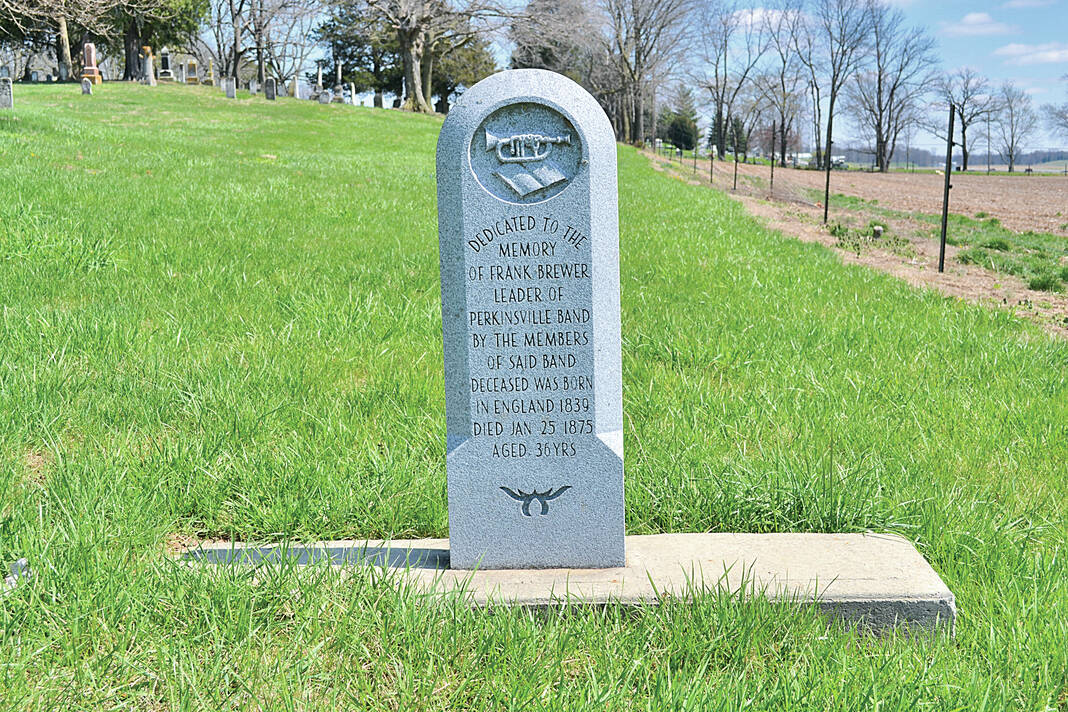
Frank Brewer headstone.
By Steve Jackson | For The Times-Post
Jackson Township was named in honor of the War of 1812 hero, General Andrew Jackson, our nation’s seventh president.
The township was one of the first five originally formed during the period 1823 to 1829 whose organizational records were destroyed in the 1880 court house fire.
Credit for the first land entry in the township goes to Daniel Wise who traveled here from Ross County, Ohio, in the spring of 1822.
In October, he entered four hundred acres of land on the south side of White River about one and one-half miles upriver from the future site of Perkinsville.
On the property was a log cabin erected the previous year by a man named Kinser who, with his family, came to the area but did not purchase any land and not long after left the area.
Prior to Wise’s arrival, Benoni Freel had cleared land and built a cabin across the river from the future site of Perkinsville making him the first settler.
Coincidently, his cabin was near one also built the year before by a man named Dewey who, like Kinser, stayed only a short time and then took his family elsewhere.
So to recap, Freel was the first settler, defined as one who stayed, and Wise was the first landowner.
Several other settlers soon followed over the next three years.
One of them was William Parkins, who with his wife and seven children, arrived in the fall of 1825.
Over the years he would become an important member of the community, so much so that when time came to choose a name for the community the name “Parkinsville” was selected.
However, when the name was officially entered at the Recorder’s office in the Madison County Court House a clerical error occurred and the name recorded was Perkinsville.
Upon arrival, Mr. Parkins pitched a tent on the north bank of White River where the town is now located.
A short while later he leased some land from Daniel Wise and built a cabin into which he moved his family around Christmas of 1825.
Parkins was a preacher and a blacksmith, establishing the township’s first blacksmith’s shop.
However, his most important contribution to the community came in the form of mills, his first being a small hand-powered mill where corn could be converted into meal.
It was capable of grinding about a bushel of meal an hour which, even with its low capacity, was a real plus for the early settlers.
Before his mill, the nearest mill was 14 miles away at Pendleton with no roads by which to make the trip there easier.
As the population increased, so too the need for a larger mill.
In 1835, and assisted by his neighbors, Parkins built a dam across White River one that can still be seen today.
Utilizing the power of the river, a new and larger mill was built.
The death of Frank Brewer on Jan. 25, 1875, was not long forgotten by anyone living in the Perkinsville area where the 35-year-old Brewer was a member of the Perkinsville band.
Described as a large, good-looking fellow, he had recently arrived in town and had taken charge of the band as its teacher.
It was Sunday night, Jan. 24.
The river had been frozen for weeks due to the extreme cold.
Mr. Brewer had been in town that night and had been drinking with some of the band members.
When he left, he crossed the ice-covered river and started for his boarding house.
From the footprints in the snow it appeared as though he had struggled to climb the hill behind the Perkinsville cemetery after crossing the river.
Too drunk and exhausted to continue, he passed out beside a gravestone.
That is where his friends found him the next morning with his upturned face looking towards the sky and his head resting beside a gravestone.
He rests today in the same cemetery.